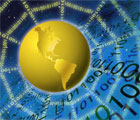 Of the fifty Muslim countries classified in ICT Readiness Index, developed by the International Telecommunication Union with the aim of identifying differences between the 150 countries around the world, only 9 countries have sufficient resources to be included in the two most important categories in this classification. A single Muslim country has the highest step in part of the country with an index “High”, while 8 others belong to the category “Top” level of capacity of adaptability and use of New Technologies of ‘Information and Communication.
Of the fifty Muslim countries classified in ICT Readiness Index, developed by the International Telecommunication Union with the aim of identifying differences between the 150 countries around the world, only 9 countries have sufficient resources to be included in the two most important categories in this classification. A single Muslim country has the highest step in part of the country with an index “High”, while 8 others belong to the category “Top” level of capacity of adaptability and use of New Technologies of ‘Information and Communication.
This was announced Monday at the opening of the 3-day seminar held in Kairouan, the “Digital Divide and ways to cope with it in the Islamic world.” The seminar which was inaugurated by El Hadj Gley, Minister of Telecommunications Technology, is held within the framework of celebrations of “Kairouan Islamic Capital for 2009.” Many experts from different Arab and Muslim countries are involved in this international event. These ICT experts should, at the end of their meetings launch the “Call of Kairouan, in the form of a message to the governments of these countries, their NGOs and organizations worldwide urging them to pay more interest to ICT in order to minimize the magnitude of this “gap”,
Held by the Islamic Scientific, Educational and Scientific Organisation (ISESCO), in association with the Ministries of Communication Technologies and Culture and Heritage Preservation, this event is aimed to raise awareness of people and decision-makers of the importance of disseminating digital culture and exchange expertise between Muslim countries in the area of information and communication technologies. Experts and specialists from different Arab countries will focus, on this occasion, on ways to spread digital culture in the Islamic world and address issues on the role of organisations, components of civil society and the private sector in narrowing the digital divide in the Islamic world and their contribution to the building of the knowledge and information society.
El Hadj Gley, Communication Technologies Minister, underlined at the opening of this meeting that digital divide remains a challenge to be taken up by the Islamic countries and it requires, to narrow it, strengthening co-operation and partnership and making the most of shared cultural and social wealth. He also underlined that the exchange of experiences in innovating and promising areas is likely to help increase investments in information and communication technologies and boost the creation of digital projects and contents.
Lamia Chaffai Sghaier, Secretary of State in charge of Information Technology, Internet and Free Software reminded, in turn, of the action plan adopted by Tunisia to build the knowledge society and narrow digital divide. This plan, she said, involves all national authorities and all parties concerned by information and communication technologies and seeks to achieve development sought- after. She also said that this programme also rests on the setting up of a coherent strategy to guarantee necessary foundations for the edification of the information society and knowledge economy. The secretary of state reminded, in this regard, of the call launched by Mrs. Leila Ben Ali, wife of the Head of State and Chairwoman of the Arab Women Organisation, to draw up a human digital solidarity charter which will enhance countries’ capacities to promote their roles in building a more balanced an a fairer information space.













